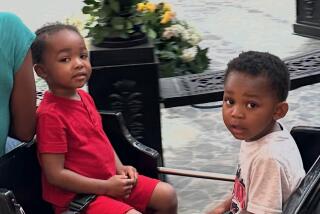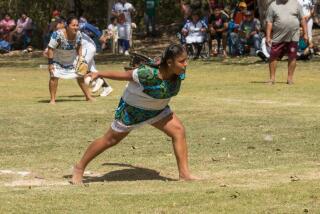Village’s Prayers Answered by Surgery on Conjoined Twins
- Share via
BELEN, Guatemala — In this tiny impoverished hamlet on Guatemala’s lush south coast, dozens of villagers are singing, clapping and praising the Lord for the successful surgery that separated twin baby girls joined at the head.
As a church band plays and three preachers take turns celebrating the word of God, people are hugging, holding hands and gathering around the family of the “Maritas”--the little Marias--born to a young banana packer and his wife.
Here, at the end of a long, stony, unpaved road, miracles are in short supply and punishing setbacks are the stuff of daily life. Villagers’ faith has been tested before. During the 1980s, many lost friends and family in a brutal army campaign.
But as people around the world applauded the complex surgery performed in Los Angeles on Monday as an astounding medical feat, here in the girls’ hometown it is seen as nothing less than the work of God.
“It was our faith that saved them,” said Loyda de Jesus Lopez, the twins’ grandmother, her eyes shining. She stood on the dirt floor of her one-room house and smiled at dozens of family members and friends who bowed their heads in prayer. Some nursed infants and others rocked babies suspended in rough twine hammocks.
In the last few weeks, the year-old twins have been the subject of marathon prayer sessions. They were honored at a special Mass in Guatemala’s Metropolitan Cathedral, and they remain a favorite topic among fellow guatemaltecos after the stories in newspapers and on TV.
“When I heard that they made it, I thanked God. I cried. This could only be the work of a miracle,” said Consuelo Celada, 40, an attendant at a Guatemala City handicrafts shop. In the store window is a 4-foot statue of the Virgin of Fatima that has become a magnet for pleas for the girls’ safe deliverance.
Belen is about 120 miles southwest of Guatemala City. It is in a deep forest of towering mahogany and other tropical hardwood trees, their trunks laced with snake-like vines. Wrinkled green pods of cacao--the raw material for chocolate--jut out from woody plants, and the swelling purple blooms of ripening bananas arch overhead. Butterflies patterned in black, red and yellow flutter across the path like confetti; parrots shriek and fuss overhead.
It is a place where doctors are a luxury few can indulge. There is limited electricity, no running water.
When the twins were born last year, “we cried every day,” said Lopez, 47, the girls’ grandmother. “We said, ‘Why did this happen to us?’ My son was sad. He felt it couldn’t have been his fault. Perhaps it was a test of God.”
The girls’ parents, Wenceslao Quiej Lopez, 21, and Alba Leticia Alvarez, 22, went to a village midwife when Alvarez became pregnant. No one detected the twins’ abnormality.
Toward the end of her pregnancy, Alvarez began to suffer knife-like pains. After eight days, the family found someone to drive her down the rutted road leading from the village to the city of Mazatenango.
Lopez thought state health insurance had been regularly deducted from his pay, but he did not have enough documentation to satisfy the local social security hospital, the family said. A private clinic performed a Caesarean section for $640, they said. They had to sell off precious farmland to pay the bill.
The twins were sent to a state hospital in Guatemala City. A Mazatenango church held a special Mass for them.
“I had so much sadness in my heart,” recalled Juliana Hernandez, 96, the twins’ great-grandmother, a tiny, silver-haired woman with a lined face and sparkling brown eyes. She speaks a Mayan dialect and wears skirts made of distinctive woven cloth.
“I thought, what kind of life will our little twins have?”
But the baby girls--Maria Teresa and Maria de Jesus--were happy, said Lopez, their grandmother. “They smiled and laughed. If me or one of the nurses walked into their room, they called out from their beds.”
Their father--called “Wency” by his family--earned $60 to $70 every 20 days for bagging bananas at a plantation, his family said. Each workday he would leave his house at 4 a.m., returning late at night, they said.
He and his wife live on his family farm, in an 8-foot-wide split-rail shack with a dirt floor. He seemed to be following in the footsteps of his father, Wenceslao Quiej, 50, also a banana worker who earns about $3 a day.
The birth of the girls was not the first great challenge faced by the 40-member extended family.
During a succession of military governments in the early 1980s, the area around Belen was hard hit. Guerrilla groups expanded, and the army struck back at labor unionists, pro-democracy activists, peasant leaders and church workers. Scores of people turned up dead or simply disappeared.
A few years ago, after the military abandoned an outpost near the Belen village school, human rights groups dug up the bodies of 16 people there.
“It was the army, but no one would dare denounce it. They would come to burn your house or take you away,” said Georgine Lopez Hernandez, 43, the twin’s great-aunt, who wore a long white dress to the celebration Wednesday.
Lopez Hernandez’s aunt and uncle were among those who disappeared.
“No matter how much you prayed, you never heard from them again,” Lopez Hernandez said.
Today, her prayers have been answered. The celebration of the twins’ surgery brought her from Guatemala City, where she works 26 days a month caring for an elderly woman.
She has spent every day of her furlough this week at prayer sessions like the open-air celebration of 70 or so Belen villagers under the trees at her sister’s small farm in a valley that rises to the Santa Maria volcano.
“It was the power of God. God granted the doctors the wisdom to cure the twins,” said Luis Mazariegos, 60, a farmer with a leathery, weather-lined face. Like most of the men at the gathering, he wore dusty jeans and work boots.
“You are with us, Lord, when we ask your help with the little twins. You have liberated the little twins and saved them from death. You have given them a new life,” said Mazariegos, praying aloud. He is a rural preacher, sanctioned by the Catholic Church to compensate for a shortage of priests in Guatemala.
As he spoke, musicians played guitar, organ and drums. Children frolicked. A turkey with its chicks pecked at crumbs. Dogs fighting over scraps of food interrupted the singing, but were shooed away with brooms and shouts.
Leonel Mejia Melgar, director of a small community program, Radio Victoria, took notes. Mejia has spearheaded a fund-raising drive for the family’s medical bills. He aired a radio report Thursday and planned to cover a prayer session at the Catholic church in Belen.
The twins’ grandfather spoke to his son Tuesday morning on a phone in a nearby town and learned that the twins were doing fine. Doctors at UCLA’s Mattel Children’s Hospital said Thursday that the twins remain in critical but stable condition. Both are being weaned off sedatives.
The twins opened and closed their eyes and responded to stimulation Thursday, pulling their hands away when squeezed. Maria de Jesus looked around when opening her eyes and moved her arms and legs slightly.
The prayer sessions in Belen have been marked by tears in recent weeks, but the friends and relatives who gathered at the grandparents’ home this week wore radiant smiles.
“We are celebrating to thank God,” said the grandfather, who listened to the service from his kitchen table as his wife set out chicken stew and blue-corn tortillas.
“The road to [God] is not easy,” a preacher, Ismael Ramos, 44, told the crowd. “There are tribulations, trials, struggles. But with the help of the Lord, we can do anything.”
*
Times staff writer Liz F. Kay in Los Angeles contributed to this report.
More to Read
Sign up for Essential California
The most important California stories and recommendations in your inbox every morning.
You may occasionally receive promotional content from the Los Angeles Times.










